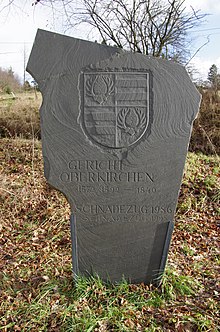Patrimonial Court of Oberkirchen
The Oberkirchen Patrimonial Court was a rulership and judicial district that emerged from an older bailiwick over the Grafschaft monastery within the Duchy of Westphalia at the end of the 16th century . The owners were members of the noble von Fürstenberg family . In 1802 the patrimonial court fell to the Landgrave of Hesse-Darmstadt as part of the secularization as part of the duchy , who assigned it to the Fredeburg office in 1807 when the new offices were established .
Limits
Adjacent to the east were the Medebach office and the city of Winterberg , to the south and southeast the county of Berleburg , to the southwest the Bilstein office , the city of Schmallenberg to the west, the Fredeburg office to the northwest and the Bödefeld court to the north . It included the places Almert , Grafschaft , Holthausen , Lengenbeck , Nieder- , Mittel- and Obersorpe , Oberkirchen , Vorwald , Westfeld and Winkhausen with a total of about 100 houses in the early 17th century. An exclave of the county of Waldeck was in the northeast of the patrimonial court with the places Nordenau and Altastenberg , whose inhabitants were liable to the count.
Emergence
In 1561, the Drost von Bilstein, Friedrich von Fürstenberg , suggested to the abbot of Grafschaft Abbey that he should in future transfer the bailiwick of his monastery to him. The previous owner, Jobst von Grafschaft, did not have any male heirs born in wedlock who could succeed him. In 1566, the Drost and the abbot signed a contract to transfer the bailiwick. After Jobst von Grafschaft's death in 1572, the new Drost Kaspar von Fürstenberg took over the bailiwick. He financially settled the claims of the heirs of his predecessor. As a thank you for his support in the war against the deposed Archbishop Gebhard Truchseß von Waldburg , the victorious new Archbishop and Elector of Cologne, Ernst von Bayern , gave him blood jurisdiction over the parishes of Oberkirchen and Grafschaft in 1592. The monastery fiefdom became a sovereign fiefdom, which in future repeatedly led to conflicts with the Grafschaft monastery. In 1594, Kaspar von Fürstenberg appointed the first judge.
history
With the neighboring territories and administrative and judicial districts, border conflicts arose again and again, especially with the county of Waldeck around the exclave of Nordenau. To secure the borders, so-called “Schnade” pulls were carried out at irregular intervals. In terms of court proceedings, the so-called Oberkirchen witch trials should be mentioned. Towards the end of the 18th century, the Cologne electors, as sovereigns, restricted the jurisdiction of the patrimonial courts. From 1786 onwards, all death sentences had to be confirmed by the elector. Shortly after the landgrave of Hesse-Darmstadt took possession of the Duchy of Westphalia in 1803, there was a dispute over jurisdiction. The new sovereign gradually withdrew all powers from the patrimonial court until the last judge resigned from his office in 1812. Even before that, in 1807, when the offices were reorganized in the Duchy of Westphalia, the patrimonial court was assigned to the Fredeburg office. The last enfeoffment with the patrimonial court took place in 1824 by the Prussian king, who had been the new sovereign since 1816. At that point, however, the court no longer had any powers.
Owner of the Patrimonial Court
- 1572–1618 Kaspar von Fürstenberg
- 1618–1646 Friedrich von Fürstenberg
- 1646–1661 Friedrich von Fürstenberg
- 1661–1718 Ferdinand von Fürstenberg
- 1718–1755 Christian Franz Theodor von Fürstenberg
- 1755–1791 Clemens Lothar Ferdinand von Fürstenberg
- 1791–1835 Friedrich Leopold von Fürstenberg
Judge
- 1594–1618 Anton Trilling from Saalhausen
- 1620–1649 Georg Weise from Brunskappel
- 1655–1668 Caspar Trilling from Schmallenberg
- 1673–1715 Jodocus Hoynck from Bracht near Schliprüthen
- 1715–1747 Ferdinand Eberhard Höynck from Bracht near Schliprüthen
- 1748–1753 Franz Michael Anton Honcamp, also a judge in Hallenberg
- 1758–1764 Johannes Theodor Schlosser
- 1766-1769 N. Evens
- 1774 Johann Wilhelm Biergans
- 1774–1796 Johannes Wilhelm Adolph Höynck
- 1796–1812 Maria Joseph Theodor Höynck
literature
- Alfred Bruns: Court and Parish Oberkirchen , Schmallenberg 1981.
- Alfred Bruns: The Oberkirchen witch protocols, in: Witches jurisdiction in the Sauerland region of Cologne, Fredeburg 1984, pp. 11–90.
- Rainer Decker: The social background of the witch persecution in the Oberkirchen court in 1630 , in: Witches jurisdiction in the Kurkölnischen Sauerland, Fredeburg 1984, p. 91–118.
- Albert Hömberg: Ecclesiastical and secular state organization (parish system and court system) in the original parish areas of southern Westphalia , Münster 1967.
- Manfred Schöne: The Duchy of Westphalia under Hesse-Darmstadt rule 1802–1816 , Olpe 1966.
- Elisabeth Schumacher: Cologne's Westphalia in the Age of Enlightenment , Olpe 1967.
- Manfred Wolf: The archive of the former Grafschaft monastery. Documents and files. Regional studies series for the Sauerland in Cologne. Publications from the Arnsberg, Brilon, Meschede and Olpe districts. Vol. 4. Ed. From the Meschede district. Arnsberg 1972.
